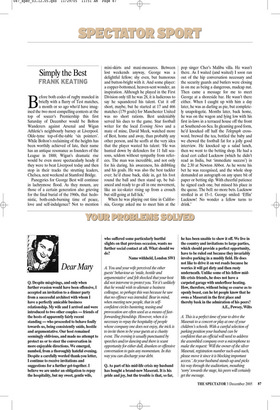Q. Despite misgivings, and only when further evasion would have
been offensive, I accepted an invitation to a dinner party from a successful architect with whom I have a perfectly amicable business relationship. My wife and I arrived and were introduced to two other couples — friends of the hosts of apparently fairly recent standing — who proceeded to behave foully towards us, being consistently snide, hostile and argumentative. Our host remained seemingly oblivious, and made no attempt to protect us or to steer the conversation in more enjoyable directions. We emerged, numbed, from a thoroughly hateful evening. Despite a carefully worded thank-you letter, I continue to receive invitations and suggestions for a further get-together. I believe we are under an obligation to repay the hospitality, but my sweet, gentle wife, who suffered some particularly hurtful slights on that previous occasion, wants no further social contact at all. What should we do?
Name withheld, London SW1 A. You and your wife perceived the other guests’ behaviour as ‘snide, hostile and argumentative’ and felt shocked that your host did not intervene to protect you. Yet it’s unlikely that he would wish to alienate a business colleague, so perhaps this was because he saw that no offence was intended. Bear in mind, when meeting new people, that in selfconfident circles bantering, teasing and provocation are often used as a means of fastforwarding friendship. However, when it is necessary to repay the hospitality of people whose company one does not enjoy, the trick is to invite them to be your guests at a charity event. The evening is usually punctuated by speeches and/or dancing and there is scant opportunity for either dull, drunken or offensive conversation to gain any momentum. In this way you can discharge your debt.



























































 Previous page
Previous page